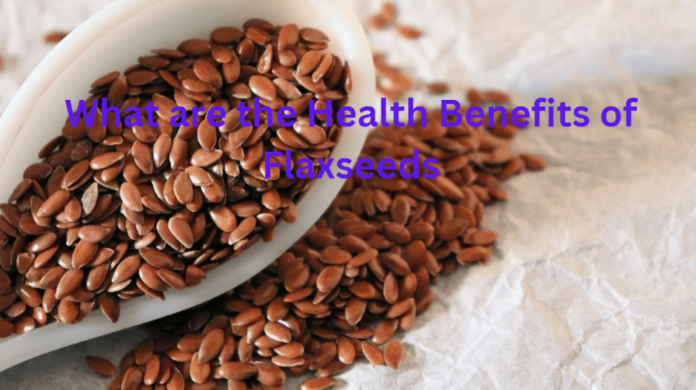Flaxseeds, also known as linseeds, have been celebrated for their numerous health benefits for centuries. These tiny seeds are packed with essential nutrients, including omega-3 fatty acids, fiber, lignans, and various vitamins and minerals. Incorporating flaxseeds into your diet can contribute to overall health and well-being in a multitude of ways. Let’s delve into the comprehensive health benefits of flaxseeds:
- Rich Source of Omega-3 Fatty Acids: Flaxseeds are renowned for their high content of alpha-linolenic acid (ALA), a type of omega-3 fatty acid. Omega-3 fatty acids are essential for heart health, brain function, and reducing inflammation in the body. ALA is a precursor to other important omega-3 fatty acids like EPA and DHA, which have been linked to a reduced risk of heart disease, stroke, and certain inflammatory conditions.
- Heart Health Promotion: The omega-3 fatty acids present in flaxseeds play a crucial role in promoting heart health. Studies have shown that incorporating flaxseeds into the diet can help lower blood pressure, reduce levels of LDL cholesterol (the “bad” cholesterol), and improve overall cholesterol profiles. These effects can significantly decrease the risk of cardiovascular diseases, including heart attacks and strokes.
- High Fiber Content: Flaxseeds are an excellent source of dietary fiber, both soluble and insoluble. Soluble fiber helps regulate blood sugar levels and lower cholesterol, while insoluble fiber promotes digestive health by adding bulk to stool and preventing constipation. A high-fiber diet has been associated with a reduced risk of obesity, type 2 diabetes, and colon cancer.
- Antioxidant Properties: Flaxseeds contain lignans, which are plant compounds with antioxidant properties. Antioxidants help neutralize harmful free radicals in the body, thereby protecting cells from damage and reducing the risk of chronic diseases such as cancer and heart disease. Flaxseeds are one of the richest dietary sources of lignans, making them a valuable addition to an antioxidant-rich diet.
- Blood Sugar Regulation: The combination of fiber, protein, and healthy fats in flaxseeds helps stabilize blood sugar levels, making them beneficial for individuals with diabetes or insulin resistance. Studies have shown that flaxseeds may improve insulin sensitivity and reduce the risk of developing type 2 diabetes. Including flaxseeds in meals can help prevent spikes and crashes in blood sugar levels, promoting overall metabolic health.
- Digestive Health Support: The fiber content in flaxseeds promotes regularity and digestive health by bulking up stool and facilitating bowel movements. This can alleviate constipation and promote a healthy gastrointestinal tract. Additionally, the mucilage content in flaxseeds forms a gel-like substance when mixed with water, which can soothe and protect the lining of the digestive system.
- Weight Management Aid: Flaxseeds are low in carbohydrates and high in fiber, protein, and healthy fats, making them a satisfying addition to meals and snacks. The combination of nutrients in flaxseeds helps promote feelings of fullness and satiety, which can aid in weight management by reducing overall calorie intake. Including flaxseeds in a balanced diet may help control appetite and prevent overeating.
- Potential Cancer Prevention: The lignans found in flaxseeds have been studied for their potential anti-cancer properties. Lignans are phytoestrogens, plant compounds that mimic the action of estrogen in the body. Research suggests that lignans may help reduce the risk of hormone-related cancers, such as breast and prostate cancer, by interfering with the growth and spread of cancer cells.
- Skin and Hair Health: The omega-3 fatty acids and antioxidants in flaxseeds contribute to healthy skin and hair. Omega-3 fatty acids help maintain skin hydration and elasticity, reduce inflammation, and promote wound healing. The lignans and antioxidants in flaxseeds also protect against oxidative stress, which can contribute to premature aging and skin damage.
- Brain Function Enhancement: Omega-3 fatty acids, particularly DHA (docosahexaenoic acid), are essential for brain health and cognitive function. Flaxseeds contain ALA, which can be converted into DHA in the body, although the conversion rate is relatively low. Nonetheless, including flaxseeds in the diet may support overall brain function and reduce the risk of age-related cognitive decline.
Incorporating Flaxseeds into Your Diet:
Now that you’re aware of the myriad health benefits of flaxseeds, you may be wondering how to incorporate them into your diet. Here are some simple ways to enjoy flaxseeds:
- Ground Flaxseeds: Grinding flaxseeds enhances their digestibility and allows your body to absorb the nutrients more effectively. You can sprinkle ground flaxseeds onto yogurt, oatmeal, smoothies, or salads for a nutritional boost.
- Flaxseed Oil: Flaxseed oil is another convenient way to reap the benefits of flaxseeds. Use it as a dressing for salads or drizzle it over cooked vegetables to add a nutty flavor and extra nutrients to your meals.
- Flaxseed Meal: Flaxseed meal, or flaxseed flour, can be used as a gluten-free alternative in baking recipes. Incorporate it into muffins, pancakes, bread, or cookies to increase the fiber and omega-3 content of your baked goods.
- Flaxseed Eggs: To make a vegan-friendly egg substitute, mix ground flaxseeds with water and let it sit for a few minutes until it forms a gel-like consistency. Use this flaxseed “egg” mixture in recipes that call for eggs, such as pancakes, muffins, or veggie burgers.
- Flaxseed Spread: Blend ground flaxseeds with nut butter and a touch of honey or maple syrup to create a nutritious spread for toast, crackers, or fruit slices.
- Flaxseed Crackers: Make your own homemade flaxseed crackers by mixing ground flaxseeds with water, herbs, and spices, then baking them until crisp. These crackers make a healthy snack option when paired with hummus, cheese, or avocado.
- Flaxseed Porridge: Cook ground flaxseeds with oats and your choice of milk to make a hearty and nutritious flaxseed porridge. Top it with fruits, nuts, seeds, or a drizzle of honey for added flavor and texture.
- Flaxseed Smoothies: Add a tablespoon of ground flaxseeds to your favorite smoothie recipe for an extra nutritional boost. The mild flavor of flaxseeds blends well with fruits, leafy greens, yogurt, and protein powder.
By incorporating flaxseeds into your daily diet, you can enjoy their numerous health benefits and support your overall health and well-being. Whether you prefer ground flaxseeds, flaxseed oil, or flaxseed meal, there are plenty of delicious and versatile ways to incorporate this nutritional powerhouse into your meals and snacks. Experiment with different recipes and enjoy the health benefits of flaxseeds as part of a balanced diet.












